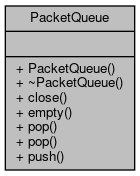#include <PacketQueue.hpp>

Public Member Functions | |
| PacketQueue (std::optional< std::function< void(void)>> callback={}) | |
| TEST_VIRTUAL | ~PacketQueue ()=default |
| TEST_VIRTUAL void | close () |
| TEST_VIRTUAL bool | empty () |
| TEST_VIRTUAL std::shared_ptr< const Packet > | pop () |
| TEST_VIRTUAL std::shared_ptr< const Packet > | pop (const std::chrono::nanoseconds &timeout) |
| TEST_VIRTUAL void | push (std::shared_ptr< const Packet > packet, int priority=0) |
Detailed Description
A threadsafe priority queue for MAVLink packets.
This priority queue will order packets based on priority but also maintains insertion order among packets of the same priority.
This is used to implement the packet priority of the firewall and to provide a queueing mechanism for packets when consumers are slower than the producers.
- See also
- QueuedPacket
Definition at line 45 of file PacketQueue.hpp.
Constructor & Destructor Documentation
◆ PacketQueue()
| PacketQueue::PacketQueue | ( | std::optional< std::function< void(void)>> | callback = {} | ) |
Construct a packet queue.
- Parameters
-
callback A function to call whenever a new packet is added to the queue. This allows the queue to signal when it has become non empty. The default is no callback {}.
Definition at line 58 of file PacketQueue.cpp.
◆ ~PacketQueue()
|
default |
Member Function Documentation
◆ close()
| void PacketQueue::close | ( | ) |
Close the queue.
This will release any blocking calls to pop.
- Remarks
- Threadsafe (locking).
Definition at line 70 of file PacketQueue.cpp.
◆ empty()
| bool PacketQueue::empty | ( | ) |
Determine if the packet queue is empty or not.
retval true There are no packets in the queue. retval false There is at least one packet in the queue.
- Remarks
- Threadsafe (locking).
Definition at line 87 of file PacketQueue.cpp.
◆ pop() [1/2]
| std::shared_ptr< const Packet > PacketQueue::pop | ( | ) |
Remove and return the packet at the front of the queue.
This version will block on an empty queue and will not return until the queue becomes non empty or is closed with close.
- Returns
- The packet that was at the front of the queue, or nullptr if the queue was closed.
- Remarks
- Threadsafe (locking).
Definition at line 105 of file PacketQueue.cpp.
◆ pop() [2/2]
| std::shared_ptr< const Packet > PacketQueue::pop | ( | const std::chrono::nanoseconds & | timeout | ) |
Remove and return the packet at the front of the queue.
This version will block on an empty queue and will not return until the queue becomes non empty, is closed with close, or the timeout has expired.
- Parameters
-
timeout How long to block waiting for an empty queue. Set to 0s for non blocking.
- Returns
- The packet that was at the front of the queue, or nullptr if the queue was closed or the timeout expired.
- Remarks
- Threadsafe (locking).
- See also
- pop()
Definition at line 132 of file PacketQueue.cpp.
◆ push()
| void PacketQueue::push | ( | std::shared_ptr< const Packet > | packet, |
| int | priority = 0 |
||
| ) |
Add a new packet to the queue, with a priority.
A higher priority will result in the packet being pushed to the front of the queue. When priorities are equal the order in which the packets were added to the queue is maintained.
- Parameters
-
packet The packet to add to the queue. It must not be nullptr. priority The priority to use when adding it to the queue. The default is 0.
- Exceptions
-
std::invalid_argument if the packet pointer is null.
- Remarks
- Threadsafe (locking).
Definition at line 164 of file PacketQueue.cpp.
The documentation for this class was generated from the following files:
 1.8.14
1.8.14